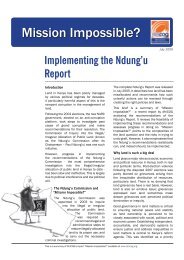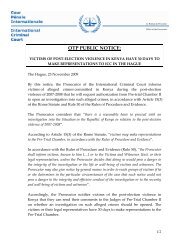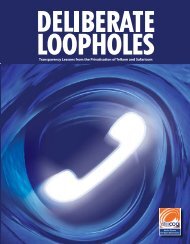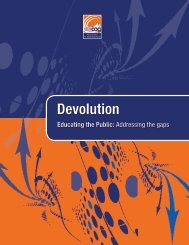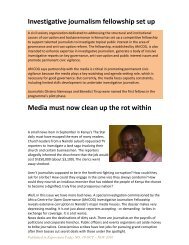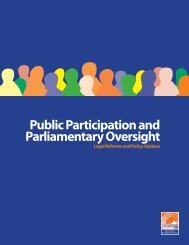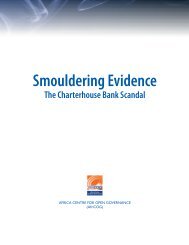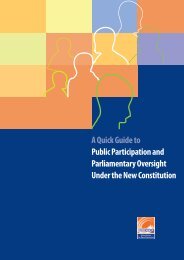Untitled - Africa Centre for Open Governance
Untitled - Africa Centre for Open Governance
Untitled - Africa Centre for Open Governance
You also want an ePaper? Increase the reach of your titles
YUMPU automatically turns print PDFs into web optimized ePapers that Google loves.
2.2. Vetting<br />
The new order brought in the vetting of public officials as a prerequisite <strong>for</strong> persons aspiring to<br />
hold public office. Candidates <strong>for</strong> high public offices now have to produce clearance certificates<br />
from the heads of the Criminal Investigations Department (CID), the EACC, the Higher Education<br />
Loans Board (HELB), the Kenya Revenue Authority (KRA), the Director of Public Prosecutions (DPP),<br />
and the Chief Executive Officers of their professional organizations.<br />
The constitution provides specifically that judges and magistrates should be subjected to a<br />
vetting procedure to establish their suitability to continue serving in the Judiciary. 8 Consequently,<br />
Parliament enacted the Vetting of Judges and Magistrates Act to provide the legal framework<br />
under which the vetting process would be conducted.<br />
The Act establishes an independent board, the Vetting of Judges and Magistrates Board, 9 to<br />
“inquire into and determine the suitability of serving judges and magistrates to continue serving<br />
in the Judiciary”. 10 Among the issues that the board must consider are:<br />
• pending or concluded criminal cases be<strong>for</strong>e a court of law against the concerned judge or<br />
magistrate;<br />
• recommendations <strong>for</strong> prosecution by the Attorney-General or Kenya Anti-Corruption<br />
Commission (KACC) 11 (sic);<br />
• the track record of the concerned judge or magistrate including prior judicial pronouncements,<br />
competence and diligence.<br />
Pending complaints that are to be considered are those from any person or body including,<br />
but not limited to, the Law Society of Kenya (LSK), EACC, Disciplinary Committee, Advocates<br />
Complaints Commission, Attorney General, Public Complaints Standing Committee and Kenya<br />
National Commission on Human Rights, National Security Intelligence Service (NSIS), the Police<br />
and the Judicial Service Commission (JSC).<br />
The vetting commenced in earnest during the year and received live media coverage and intense<br />
public interest. The highlight of the vetting process was the appointment of Dr. Willy Mutunga,<br />
a renowned re<strong>for</strong>mist and human rights defender, 12 as the Chief Justice of the Republic of Kenya.<br />
Naturally, the vetting exercise faced opposition from some quarters. The Kenya Magistrates<br />
and Judges Association (KMJA) <strong>for</strong> example viewed the vetting of judicial officers as “punitive,<br />
degrading and discriminative” and intended to condemn all of them as “corrupt and buyable”. 13<br />
8 Article 23 (1) of the Sixth Schedule<br />
9 Section 6 (1)<br />
10 Section 2<br />
11 While the Act states Kenya Anti Corruption Commission, KACC has since been replaced by the Ethics and Anti-<br />
Corruption Commission<br />
12 AfriCOG wrote to the Judicial Service Commission commending the process of nominations of both Dr. Willy<br />
Mutunga to the position of Chief Justice of Kenya and that of Nancy Baraza to the position of Deputy Chief Justice<br />
13 “Judiciary not happy with vetting plan,” Daily Nation, 14 October 2011<br />
7




